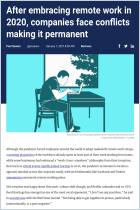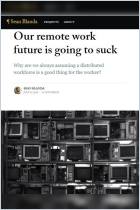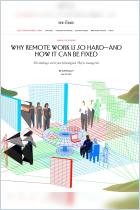
Corporate America is coming around to remote work. But more big changes lie ahead.
Flexible work is here to stay. But the shape it will take is up for debate in virtual board rooms around the world.
Recommendation
Many CEOs worry that remote work damages corporate culture and productivity, and some companies are forcing staff members to return to the office. As Taylor Telford reports in The Washington Post, JPMorgan Chase and Citigroup have mandated that employees get fully vaccinated and show up in their cubicles. Google acknowledges the necessity of remote work, but it’s buying its current office in the United Kingdom and building another one. Telford notes that CEOs may be at loggerheads with their workers given that in January 2022, fully 55% of remote employees said they’d consider quitting if their company eliminates working at home.
Summary
About the Author
The Washington Post reporter Taylor Telford covers national and breaking news.





















Comment on this summary or Iniciar a Discussão